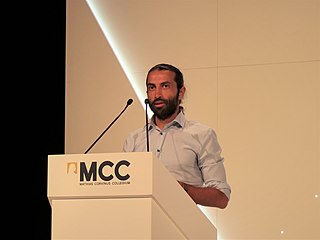A Quote by Bill Maher
The people [in the USA] are not very well informed. They certainly don`t know history. They certainly are not interested in foreign affairs very much, unless it comes right to their doorstep. They all learn history through wars. They learn geography through wars.
Related Quotes
I went out to cover the wars in Iraq and Afghanistan fundamentally [in Buzzing at the Sill] because I was interested in war as a notion and in experiencing it. I was interested in history and how societies form. I was interested in the recent history of what had provoked these wars. So when I finally got out there, I was really seeing the wars through the American perspective, much more than through being embedded with American soldiers and Marines.
I am not a historian, but I find myself being more and more fascinated by history and now I find myself reading more and more about history. I am very interested in Napoleon, at the present: I'm very interested in battles, in wars, in Gallipoli, the First World War and so on, and I think that as I age I am becoming more and more historical. I certainly wasn't at all in my early twenties.
I get questions from Richard Sandomir at the New York Times or Michael Hiestand at USA Today about issues .., 'well, there's a blog site that says you root too hard for the Red Sox. Or people don't like you because you're rooting against their team ...'I don't want to say it's bad. There are certainly things you learn from the internet. You certainly learn from people's opinions. I think you're going to get some of the negative a lot more than the positive, but I think you can learn from it.
There's a lot we should be able to learn from history. And yet history proves that we never do. In fact, the main lesson of history is that we never learn the lessons of history. This makes us look so stupid that few people care to read it. They'd rather not be reminded. Any good history book is mainly just a long list of mistakes, complete with names and dates. It's very embarrassing.
All American wars (except the Civil War) have been fought with the odds overwhelmingly in favor of the Americans. In the history of armed combat such affairs as the Mexican and Spanish-American Wars must be ranked, not as wars at all, but as organized assassinations. In the two World Wars, no American faced a bullet until his adversaries had been worn down by years of fighting others.
I think the arc of history is long, and it bends toward justice. And I think that's what the 'Star Wars' message is. You know, the dark side is in the human heart. And chaos is very troubling for an individual or for a culture, which can lead you to authoritarian leaders. But the arc of history is on the right side. I believe that.
The very fears and guilts imposed by religious training are responsible for some of history's most brutal wars, crusades, pogroms, and persecutions, including five centuries of almost unimaginable terrorism under Europe's Inquisition and the unthinkably sadistic legal murder of nearly nine million women. History doesn't say much very good about God.


































